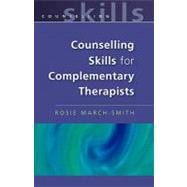
Rosie March-Smith is a registered psychotherapist with the UK Council for Psychotherapy, and currently runs a private practice in the UK.
| Acknowledgements | viii | ||||
| Foreword | ix | ||||
| Chapter 1 Patients deserve more than sympathy | 1 | (13) | |||
|
3 | (3) | |||
|
6 | (2) | |||
|
8 | (1) | |||
|
9 | (1) | |||
|
10 | (1) | |||
|
11 | (1) | |||
|
12 | (1) | |||
|
13 | (1) | |||
| Chapter 2 Why counselling needs rules | 14 | (11) | |||
|
16 | (1) | |||
|
17 | (3) | |||
|
20 | (1) | |||
|
21 | (2) | |||
|
23 | (2) | |||
| Chapter 3 How to listen through the words | 25 | (11) | |||
|
26 | (3) | |||
|
29 | (1) | |||
|
30 | (3) | |||
|
33 | (1) | |||
|
34 | (2) | |||
| Chapter 4 Metaphors and mind magic | 36 | (9) | |||
|
37 | (2) | |||
|
39 | (3) | |||
|
42 | (1) | |||
|
42 | (2) | |||
|
44 | (1) | |||
| Chapter 5 The search for meaning in illness | 45 | (12) | |||
|
46 | (3) | |||
|
49 | (1) | |||
|
50 | (2) | |||
|
52 | (2) | |||
|
54 | (1) | |||
|
55 | (2) | |||
| Chapter 6 The therapeutic relationship | 57 | (12) | |||
|
59 | (2) | |||
|
61 | (1) | |||
|
62 | (3) | |||
|
65 | (2) | |||
|
67 | (1) | |||
|
68 | (1) | |||
| Chapter 7 Perils and psychic protection | 69 | (14) | |||
|
70 | (2) | |||
|
72 | (1) | |||
|
73 | (4) | |||
|
77 | (1) | |||
|
78 | (2) | |||
|
80 | (2) | |||
|
82 | (1) | |||
| Chapter 8 Dealing with difficulties: finding support | 83 | (17) | |||
|
84 | (3) | |||
|
87 | (2) | |||
|
89 | (2) | |||
|
91 | (2) | |||
|
93 | (2) | |||
|
95 | (2) | |||
|
97 | (1) | |||
|
98 | (2) | |||
| Chapter 9 Endings and never-endings | 100 | (13) | |||
|
102 | (1) | |||
|
103 | (4) | |||
|
107 | (2) | |||
|
109 | (2) | |||
|
111 | (2) | |||
| Appendix Referrals and resources | 113 | (2) | |||
| References | 115 | (3) | |||
| Index | 118 |
The New copy of this book will include any supplemental materials advertised. Please check the title of the book to determine if it should include any access cards, study guides, lab manuals, CDs, etc.
The Used, Rental and eBook copies of this book are not guaranteed to include any supplemental materials. Typically, only the book itself is included. This is true even if the title states it includes any access cards, study guides, lab manuals, CDs, etc.